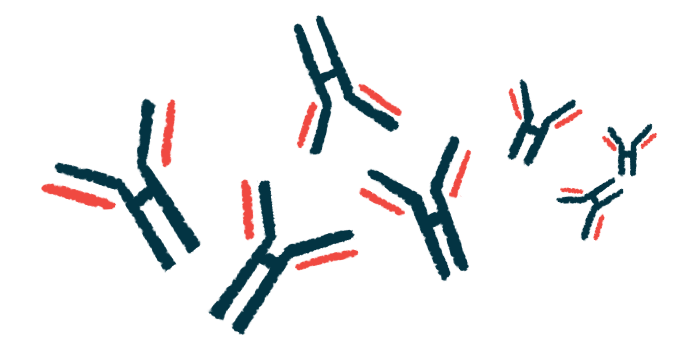Increased complement activation linked to antibodies against AChR
Study supports complement-blocking medicines for these MG patients
Written by |

People with myasthenia gravis (MG) who are positive for antibodies against the acetylcholine receptor (AChR) — the most common MG-causing antibodies — tend to have increased activation of part of the immune system called the complement cascade, according to a recent study.
However, increased complement activation was not seen in people with MG who were negative for these antibodies.
“Our results strongly support the concept that complement activation networks are deregulated in patients with [anti-AChR-positive] MG,” researchers wrote, adding the findings support the use of complement-blocking medicines to treat MG in patients with anti-AChR antibodies.
The study, “Complement activation profiles in anti-acetylcholine receptor positive myasthenia gravis,” was published in the European Journal of Neurology.
Complement system activation plays central role in driving MG
MG is caused by the immune system mistakenly launching an attack that interferes with the communication between nerve and muscle cells. This autoimmune attack is thought to be driven by antibodies targeting proteins that are important for nerve-muscle communication. While antibodies targeting AChR are the most common, MG patients may also have antibodies targeting other proteins, such as muscle-specific kinase (MuSK).
The complement cascade, also known as the complement system, comprises a group of immune proteins that are found in the blood and other bodily fluids. Normally, complement proteins exist in an inactive state, but in response to certain signals, they are activated to drive a powerful inflammatory attack. An antibody binding to its target, such as anti-AChR binding to proteins on muscle cells, is one of the signals that can activate the complement cascade.
A growing body of research suggests that complement activation plays a central role in driving MG. The approved MG treatments Soliris (eculizumab) and Ultomiris (ravulizumab-cwvz) both work by blocking complement activation. The two therapies are marketed by AstraZeneca, which was not involved in this study. However, six of the study’s 11 researchers have financial links to pharmaceutical companies, including Alexion Pharmaceuticals, which originally developed Soliris and Ultomiris and was acquired by AstraZeneca in 2021.
In the study, a team of scientists in Germany and the U.K. conducted a series of tests to profile complement activation in different groups of people with MG.
In their first exploratory analysis, the researchers analyzed blood samples from 25 people with early-onset generalized MG and 25 people without MG. All MG patients in this analysis were positive for anti-AChR antibodies and had not received any immune-suppressing treatments.
Results showed that MG patients had elevated levels of several activated complement proteins, including sC5b9, C3a, C4a, Ba, and Bb. The researchers noted that these findings are consistent with what would be expected of the complement cascade being activated by antibodies.
Patients with anti-MuSK antibodies did not show elevated complement activation
In a second analysis, the scientists analyzed samples from 51 people with anti-AChR-positive generalized MG, 12 people with anti-MuSK-positive MG, and 27 people with MG who were not positive for any known disease-associated antibodies. All of these MG patients were on immunosuppressants. The analysis also included 26 people without MG who served as a reference for comparison.
Consistent with the first exploratory analysis, results from the second analysis showed increased levels of many activated complement proteins in MG patients positive for anti-AChR antibodies. However, among MG patients positive for anti-MuSK or without known antibodies, complement activation did not differ significantly from people without the disease.
“Our finding that complement activation is increased in [anti-AChR-positive] MG despite standard immunosuppression supports the use of [medicines that stop complement activation] as a therapeutic strategy, potentially early during the disease course or in refractory cases,” the researchers wrote.
Exploratory analyses did not show a clear association between the levels of complement proteins and clinical disease activity, though the researchers noted that these analyses were limited by the relatively small number of patients. The team called for further research to understand the role of the complement cascade in MG and the potential clinical implications.





Leave a comment
Fill in the required fields to post. Your email address will not be published.